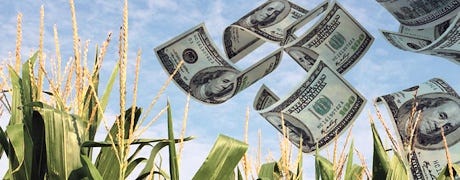
Weeds may be top of mind for your operation, but often only at certain times of the year — perhaps in the spring, or when you can see them. Yet, more than ever before, the economics and agronomics of weed control are shaping up to be more of an all-year issue. Even when understanding the changing science of weeds, economics still come into play when it’s time to build that weed control plan.
Determining the necessity of year-round weed control is an important part of the discussion between you and your local agronomist, especially since it’s something that can potentially cause costs to exceed revenues.

Weed control isn’t just a spring fling anymore, as tactics for both spring and fall yield results.
Unfortunately, coming to a firm conclusion on the subject isn’t as easy as you might think because many variables must be considered — all of which make creating a one-size-fits-all formula virtually impossible.
Timing and weeds
Are you going to spend the time and money to do fall applications to address winter annuals, or do you just concentrate your weed control efforts in spring and summer at the start of the growing season? Can you afford to do both? Better yet, can you afford not to? These are questions growers probably need to ask themselves. Being aware of all the variables is important to not only see the “big picture,” but also make good business decisions.
“If there are weeds that can really hit yields hard, addressing them in the fall may be wise, especially if doing so will reduce weed seeds, or free up time in the spring for other work,” says Raymond Massey, Extension professor of agricultural and applied economics at the University of Missouri.
Massey says climate, geography, weed species and even soil moisture are all crucial elements of your weed control analysis.
According to Massey, yield is the key, economic-related element that gets everyone’s attention. That’s why he says identifying weeds and determining how they will potentially impact crop yield is one of the most important parts of the equation.
“If a weed doesn’t impact your yield, you have a good reason not to do a fall application,” says Massey.
But if you decide year-round weed control is necessary, there’s going to be a cost whether you do it yourself, or hire someone.
Application considerations
Gary Schnitkey, professor of agricultural economics at the University of Illinois, says hiring someone to do a fall application could cost $4 to $5 per acre, as well as an additional $10 to $15 per acre in chemical costs.
“Paying this extra money for a fall application could impact what you end up doing in the spring,” says Schnitkey. “And you will have to make up for these extra costs somewhere, like getting higher yields to pay for it.”
However, before determining whether or not to do a fall application, Schnitkey says the first priority in the decision-making process should be identifying the problem.
“You need to look at the weeds that are out there and determine what’s needed to address them, and then you need to target only the fields where you’ve had the most weed problems,” he says.
Massey cautions that weed control should not be a single-year decision because you don’t want to let a weed survive and create problems later, especially if controlling it is particularly difficult. As farmers take a closer look at the weed seed bank and its implications on crop yields, this will be a more complex question.
“The year you need to control weeds, you might lose money on a field. But over the long term, you protect your profitability because weeds are less of an issue,” says Massey.
-Yontz writes from Urbandale, Iowa.
Solution Center is independently produced by Penton Farm Progress through support from SureStart® II herbicide. For more information, visit GetMoreTime.com.
About the Author(s)
You May Also Like




